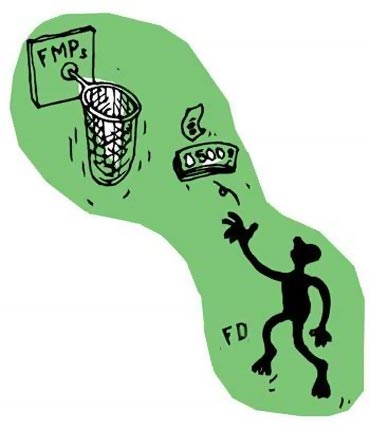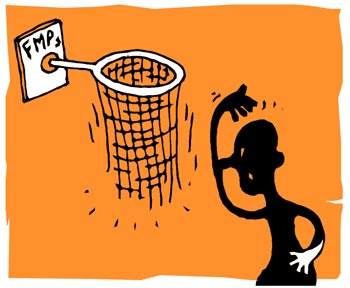Photographs: Rediff Archives Salil Dhawan, Investment-mantra.in
Quite often for investors fixed maturity plans and fixed deposits are alike but there are some distinct differences. The protection of capital is foremost selling point for both FMPs and FDs. But FMPs score over FDs on a few parameters.
What are fixed maturity plans (FMPs)?
Since we all are aware of how fixed deposit works, let's have a close look at fixed maturity plans first. Fixed maturity plans are close-ended debt schemes with a maturity horizon varying from one month to five years. They are launched with predetermined maturity date; so as the investments are made in such securities which mature at or around the same time as the schemes do.
Investors are not allowed for premature redemption during this period and are warranted to stay till maturity. However, premature withdrawals are allowed on the stock exchanges where these units are listed and traded at market prices. However this route is not yet very liquid. The schemes are shut down generally once they get matured.
NEXT: Are FMPs as safe as FDs?
Courtesy: www.investment-mantra.in
FMPs vs FDs: Why FMPs give better returns
Are FMPs as safe as FDs?
FMPs are not absolutely safe as an investment option and have a probability of default and credit risk since money collected through FMPs is invested in companies and there is a probability of default in payment by such companies. To offset this risk, FMPs offer slightly higher returns than the safer fixed deposits. However, as in the case of fixed deposits, one cannot be sure of exact returns at the time of investment.
In a rising interest rate scenario, FMPs are seen as best investment tools. They are better investment options than bank fixed deposits (FD) as they offer higher after tax returns with minimal extra risk. Common misconception here generally is that both FMPs and FDs give guaranteed returns. While it is true for the latter, it doesn't hold true for the former. Investors know in advance that they will get returns but with FMPs these are indicative returns.
FMPs are close ended debt funds with a fixed maturity but these are always a possibility that their returns can deviate from what has been indicated. In case of FDs returns are fixed. Investor will exactly get what they have been promised. FMPs yield varies only marginally. The yields vary because for the same tenure the yields on debt instruments are usually in range which is why FMPs of similar tenure will have comparable yields.
The difference in yields between two FMPs arises out of risk taken on in the portfolio -- a FMP having top rated instruments in its portfolio would deliver comparatively less than FMP with lower rated papers. Higher returns means that the fund manager has been taking on more credit risk in the portfolio.
NEXT: Which one is more tax efficient -- FMPs or FDs?
FMPs vs FDs: Why FMPs give better returns
Which one is more tax efficient: FMPs or FDs?
Significant issue to discuss is tax treatment in case of FDs and FMPs. The interest incomes from FDs are added to investor's income and taxed at applicable tax slabs.
Income from FDs is categorised as 'Income from other sources' under the income tax laws. In case of FMPs, tax implication depends on the investment option -- Dividend or Growth.
Under the dividend option, investors have to bear dividend distribution tax whereas under growth options returned are treated as capital gains (short or long term depending on tenure of investments). Dividend option is best suited for investors who fall under higher tax bracket (if the investment horizon is less than a year). Though the dividend received is tax free in the hands of investors, a Dividend Distribution Tax (DDT) of 14.165 per cent is levied by the mutual funds and deducted from investors' proceeds before pay out.
For FMPs of more than one-year tenure, one needs to pay tax at 10 per cent or 20 per cent depending on whether one chooses to have indexation. Inflation erodes the real value of any investment. So every year, an inflation index based on the prevailing rate of inflation is announced.
The cost of investment is indexed by multiplying the index of the year of maturity and divided by the inflation index prevailing in the year of investment. If you have arrived at an indexed cost, then the long-term capital gain is taxed at 22.66 per cent and if you do not opt for the indexed cost, then the tax is 11.33 per cent of the gains.
FMPs vs FDs: Why FMPs give better returns
Interest income from fixed deposits, irrespective of tenure, is treated as income from other sources and normal tax slabs apply. So in case an investor is in the 30 per cent tax slab, he will be required to pay tax @30 per cent on the interest earned through fixed deposits. But the same investor will have to pay only 10 per cent or 20 per cent on an FMP with tenure of more than one year.
An investor in an FMP with tenure of over a year who opts for growth option to take gains as capital appreciation will attract a tax rate of 10 per cent or 20 per cent (depending on whether or not indexation is applicable). As against this, interest on bank's fixed deposit of similar tenure might be taxed at 30 per cent.
In case of short-term capital tax, it is similar to interest income from bank fixed deposits. The returns are added to the income of the investor and taxed as per his/her slab.
FMPs of longer-term maturities spanning over more than two financial years also offer better tax efficiency through double indexation benefits. For instance, if you buy an FMP of 14 months in February 2010, scheme will mature in April, 2011. In this case, the investor will get inflation indexation benefits for the years 2009-10 and 2011-12.
NEXT: Overall, which one is best for you -- FMPs or FDs?
FMPs vs FDs: Why FMPs give better returns
Overall, which one is best for you: FMPs or FDs?
So which one is more beneficial: The answer is FMPs. Thanks to indexation benefits, FMPs are more tax efficient as indexation lowers tax liability. FMPs are more tax efficient while FDs are safer. This is true to certain extent. But FDs have their share of risk as well.
The credit rating of an FD is an indicator of degree of risk associated with it. For instance a rating of 'AAA/FAAA' offers the highest value of safety. So an FD carrying a credit rating lower than this carries higher risk. In case of FMPs, one should ensure that FMPs should be from a reputed fund house which invests in good corporate paper.
In 2008, many FMPs invested in real estate companies and faced problems when the downturn started. Hence one should check on fund house before selecting the FMP. For FMPs, they are tax-efficient and yield favourable returns. However, they offer no guaranteed returns (unlike fixed deposits) and ample liquidity.
Given the present credit market tightness, fund houses launch more FMPs. Investing in short term FMPs is generally advised at this point of time. They can be an excellent investment for investors who clearly understand the risks associated with them.
In nutshell, both FDs and FMPs are viable investment options if you are looking to fetch competitive returns at minimum risks. Which one you choose depends on your risk profile and investment objective among other factors. While FMPs may appeal to investors willing to take little risk for that extra return, FDs will find favour with investors who are satisfied with lower but assured returns.






Comment
article